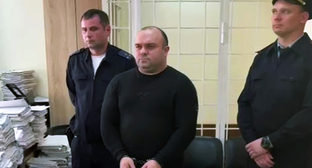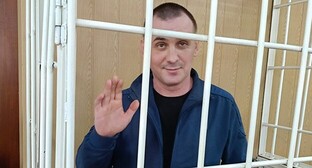12 June 2005, 20:48
Amnesty International: Georgia
Covering events from January - December 2004
Police used excessive force on several occasions. Hundreds of perpetrators of attacks on religious minorities remained unpunished. Chechens sought by the Russian Federation continued to be in danger of extradition.
Background
Mikhail Saakashvili was elected President in January in elections that were assessed as largely positive by observers from the Organization for Security and Co-operation in Europe (OSCE).
In February amendments to the Constitution were adopted that increased presidential powers. There was widespread criticism both of the amendments themselves and of the speed with which they were passed.
In March the pro-government National Movement won a partial rerun of the much-criticized parliamentary elections conducted under the previous government in November 2003. From the opposition, only the New Right/Industrialists bloc gained enough votes to have any representatives in parliament, giving the government a virtually unopposed majority. The OSCE described the elections as "the most democratic since independence", while also noting irregularities.
Arrests and investigations as part of the government's anti-corruption campaign were in many cases characterized by procedural violations.
Journalists critical of the authorities reportedly risked reprisals including beatings and dismissal from their work.
After the so-called "Rose Revolution" of November 2003, tensions increased between the central government and the autonomous republic of Ajaria. In May, the Ajarian leader, Aslan Abashidze, stepped down following a series of public protests against his leadership. The central government took direct control of the region for an interim period and elections on 20 June resulted in an overwhelming victory for President Saakashvili's supporters.
Shortly after the collapse of Aslan Abashidze's government, tensions increased between the central government and the internationally unrecognized breakaway region of South Ossetia. The conflict escalated from June for several weeks with frequent shoot-outs that led to casualties, including civilians, on both sides. No resolution to the disputed status of the region was in sight by the end of 2004.
In October disputes over the results of presidential elections in the internationally unrecognized breakaway region of Abkhazia led to hundreds of supporters of the two main candidates taking to the streets. Raul Khadzhimba, protege of the outgoing President, protested against the declaration by the Central Election Committee and the Supreme Court of the opposition candidate Sergey Bagapsh as the winner by a small margin. In November supporters of both candidates occupied government and state television station buildings. In December an agreement was reached whereby Sergey Bagapsh and Raul Khadzhimba would run for President and Vice-President respectively in new elections planned for January 2005.
In June the Council of the European Union included Georgia along with Armenia and Azerbaijan in the European Neighbourhood Policy.
The new government received substantial international aid. At a joint European Commission/World Bank conference in June, individual countries and international organizations pledged around US$1 billion for the period 2004-2006.
In July the European Union launched a one-year programme aimed at assisting the authorities with the reform of the country's criminal justice system.
Torture and ill-treatment
Reports of torture and ill-treatment in pre-trial detention continued. In at least two cases suspects died allegedly as a result of torture or excessive use of force by police.
- On 1 September, seven men were reportedly detained in the western town of Zugdidi, accused of membership of a paramilitary group and possession of firearms and explosives. One of them, Geno Kulava, was said to have been tortured and ill-treated in the police station of Khobi district. The report described how he was suspended from a pole between two tables, kicked and beaten, including with truncheons, and dropped on the floor. A burning candle was held against his forearm. After his lawyer complained to the court that his client had been tortured, Geno Kulava was examined by forensic experts on two occasions. They found traces of severe beatings and haemorrhages in several parts of his body. One of Geno Kulava's co-defendants, Levan Dzadzua, was allegedly beaten by police at another police station in Zugdidi. On 15 November Geno Kulava was released from prison following a court ruling, reportedly because of procedural violations. However, he was immediately rearrested, accused of abducting a resident of Zugdidi. Geno Kulava and Levan Dzadzua were still detained at the end of 2004. The authorities had reportedly not opened a thorough and impartial investigation into the allegations of torture and ill-treatment, and none of the alleged perpetrators had been brought to justice.
Excessive use of force by police and prison officers
Police used excessive force on several occasions. Concern was heightened by government statements that apparently encouraged the use of force by police and prison personnel or endorsed police operations where excessive force had been used.
- In January police used excessive force while breaking up an unauthorized demonstration that blocked a main road in the west of the country. Some 200 demonstrators were peacefully protesting against the detention of Zaza Ambroladze, a resident of Imereti region charged with illegal possession of firearms. Television news footage showed dozens of people being kicked and beaten by police, including with truncheons. The following day Imedi TV broadcast a statement by President Saakashvili applauding the police operation. He stated that anyone who "defends criminal bosses" would be "dealt a very hard blow in the teeth".
Religious minorities
Hundreds of perpetrators of attacks on religious minorities remained unpunished.
- In March police detained Basil Mkalavishvili, a defrocked Georgian Orthodox priest, and eight of his supporters in connection with a series of violent attacks on religious minorities. AI welcomed the detention of the nine, while expressing concern about the excessive force used in the police operation. The arrest, however, was not a clear signal in favour of religious freedom. Immediately after the police operation President Saakashvili publicly stated that "the Georgian state, not some local extremist who beats and raids people, should protect Georgia from harmful alien influence and extremism". The trial opened in Tbilisi in August. There were allegations that at least four victims who had suffered particularly severely from the attacks - Leila Kartvelishvili, Beniamin Bakuradze, Otar Kalatozishvili and his son Zaza Kalatozishvili - were dropped from the list of those called to testify in court.
Risk of extraditions
Chechens accused of "terrorism" continued to be in danger of extradition to the Russian Federation where they risked serious human rights violations. The Russian authorities frequently stated that Chechens wanted by them for "terrorism" were hiding in the Georgian Pankisi gorge, a charge that Georgia denied. In February, President Saakashvili told the Russian radio station Ekho Moskvy that people suspected of "terrorist" attacks in Moscow had already been extradited, adding an invitation to the Russian authorities to help find anybody remaining so that they could "throw them out of Georgia together". In October, the Georgian Interior Minister announced that Georgia would be prepared to provide the Russian authorities with lists of those living in the gorge. As a member of the Council of Europe and a party to the UN Refugee Convention and its Protocol, Georgia is obliged to refrain from deportations or extraditions that put people at risk of serious human rights violations.
- Several local human rights activists alleged that the Georgian authorities facilitated the detention of the Chechens Khusein Alkhanov and Bekhan Mulkoyev by officers of the Russian Federal Security Service in North Ossetia in Russia on 19 February. This was categorically denied by senior government officials. The two men had been detained by Georgian border guards when crossing into Georgia in August 2002. They were held in detention until 6 February 2004 when they were released by Tbilisi regional court. On 16 February local groups reported the two men had "disappeared", only one week before a delegation from the European Court was due to interview them in Tbilisi.
Allegedly fabricated charges
- Merab Mikeladze and Lasha Chakhvadze, two supporters of the then Ajarian leader Aslan Abashidze, were detained by police in Tbilisi in February. Police charged them with illegal possession of weapons, a charge that AI believed to be fabricated. The two were released from custody on 27 February in what many termed a "deal" between the central authorities and the Ajarian authorities involving the subsequent release of two members of the youth movement Kmara! who had been detained in Ajaria. After their release, Merab Mikeladze and Lasha Chakhvadze left for Ajaria and refused to return to Tbilisi for further investigations. Shortly after the change of government in Ajaria, Lasha Chakhvadze was detained in Batumi. He was additionally charged with putting up resistance to the police in relation to his detention in February. He had not gone on trial by the end of 2004. Merab Mikeladze was believed to be in hiding at the end of the year.
Clampdown on dissent in Ajaria
The government of Aslan Abashidze intensified its clampdown on dissent following the "Rose Revolution" of November 2003. This included the detention and in some cases ill-treatment of activists critical of Aslan Abashidze and his policies, and ill-treatment and intimidation of independent journalists. AI received numerous reports of excessive use of force by Abashidze supporters against demonstrators critical of the Ajarian authorities.
- In February, Gocha Khvichia and Imeda Tavdgeridze, two members of the youth movement Kmara!, which was particularly vocal in criticizing the Ajarian authorities, were allegedly beaten by Ajarian law enforcement officers at a checkpoint. The two young men, together with another Kmara! member, Sofiko Pataraia, and her sister, had been taken off a bus travelling from Tbilisi to Batumi after the officers had found Kmara! leaflets in their bags. All four were detained in a house near the checkpoint. Reportedly, the young women were forced to watch the two men being beaten and kicked by some 20 men, some of whom were masked. They were threatened and warned not to contact journalists or human rights organizations. The four were released later that day.
AI country visits
AI delegates conducted research in Tbilisi and Batumi in March.
See the source file here.
More about Georgia:
More about Caucasus:




